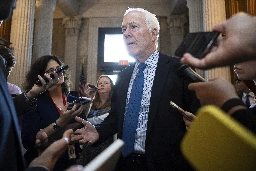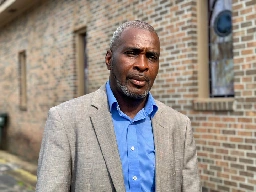TIL ocelots are native to the US.
It is possible to do scientific testing without spreading a virus outside of the carefully controlled laboratory environment.
I have a friend who is too beautiful (and unfortunately meek) for her own good, attracting stalker types with horrifying regularity. This is a great change.
How the hell. I'm in Seattle and watched it and it was so faint, barely visible at all. You wouldn't have even noticed it if you weren't looking for it.
Damn, you had a better view of it than I did up here in Washington (State).
That is waaaaaaaay too much for me to remotely consider.
Probably dumped them. Guess I could be worse....
Hope it's available to stream then as well.
No, it's your opinion.
I love this movie and have seen it many times, but I'm not sure rewatching it makes it all that much different. Do you have any examples to share?
Just FYI, the striped pole attached to the hydrant is so it can be found under snow.
Sounds like he might not necessarily have intended to kill himself so much as to just burn the house down.
It's not as though they're not given the opportunity to become a state. They have voted in the past for things to stay as-is. If I recall, it was a pretty close vote, however.
Yeah, but once you get them a few years older, you need to start explaining the less useful things taxes go into and how divisive the entire topic is.
Given the way it is portrayed on the news, I thought it already was practically leveled. Or does this mean extra leveled? Like salt the earth.
Okay, but to be fair, school does not teach about taxes.
Probably because if they did, they would have a neverending supply of rebellious little adults on their hands, from either side of the political sphere.
This is not very helpful when you're making little cog workers and soldier yes men.
You don't fucking say.
It's almost like switching from monarchism and aristocracy to oligarchism and capitalism didn't really change much of anything. I'm very shocked.
It appears to just be in the sink, but fine droplets can travel farther than you would think.
It's better not to rinse chicken before cooking. Droplets can contaminate nearby surfaces.
Ernest needs to quickly delegate or this instance will quickly die
I appreciate that earnest made a post yesterday, or maybe it was the day before, saying that he is not dead and hasn't given up on kbin. It's not on this magazine, so I'm not sure where it was since this seems to be the most appropriate one, but in any case.
Reassuring us that things will improve at some point someday probably isn't enough, and I both moderate and donate to him every month, so I'm a pretty "serious" kbinner. I'm sure we've already lost many people who are less dedicated and just want something that works.
This site has been nearly unusable for days. There was the one day recently where it was entirely unusable. Everybody who uses this platform is an 'internet person". We need a platform which is (mostly) fully functional (mostly) every day.
Kbin needs to be fixed.
Ernest needs to give up on this being a one-man show and invite other moderators and contributors. Even I am looking at mbin because usability has just been so terrible that it's not worth the frustration and disappointment.
/rant
Edit: To make this thread even better, I got an error when I tried to post it. Twice.
ProPublica editor-at-large Eric Umansky started investigating police oversight after an NYPD officer hit a teenager with a car in 2019. In the years since, he’s learned how police departments have undermined the promise of body-worn cameras.

ProPublica editor-at-large Eric Umansky started investigating police oversight after an NYPD officer hit a teenager with a car in 2019. In the years since, he’s learned how police departments have undermined the promise of body-worn cameras.
---
I got my first real lesson in police accountability in 2019 on Halloween. My wife, Sara Pekow, and our daughter had watched an NYPD officer drive the wrong way up a Brooklyn street and hit a Black teenager. The police had been chasing him as a suspect in the theft of a cellphone. When the boy rolled off the car and ran away, the officers turned their attention to other nearby Black boys who seemed to be simply trick-or-treating. The police lined them against the wall of our neighborhood movie theater, cuffed them and took them away.
At the time, I was editing coverage of the Trump administration, not policing. But I was troubled and, frankly, curious. I ended up waiting outside the police precinct with the boys’ families. The boys were released hours later, with no explanation, no paperwork and no apology.
The next day I reached out to the NYPD’s press office and asked about what happened. Eventually, a spokesperson told me that nothing inappropriate had occurred. A police car hadn’t hit the kid, he said. The kid had run over the hood of the car.
I couldn’t get it out of my head. Not just what had happened, but the NYPD’s brazen denial of what my family and others had witnessed. Surely, I thought, that wouldn’t be the end of it.
I was wrong.
Does anyone do requests?
I have this hat (beanie type, I guess) that I've had for just about 20 years now. I've been wearing it regularly, and it still seems to be in good shape, but I know it won't last forever. I'm very attached to this hat, silly though it may sound.
I'd like to have a replica or two of it made. I don't have a pattern, but it's not all that complicated. Seems to be made of acrylic, although relatively high quality and comfortable. Not entirely certain. If I can find somebody in the Pacific Northwest to make it for me, I could bring the hat over.
Sorry if this type of request isn't what the community is for. I can provide pictures if anyone is interested.
Gifts for young kids who are really into airplanes?
I've got a nephew who is 3-something years old. He's really into airplanes. All of the ideas of gifts I've found have either been books (I give him books, but I'd like to give him something interactive) or toys that are way above his age level.
Does anyone have a recommendation for a good gift for a 3 to 4-year-old who loves airplanes?
Edit: I just want to give a big thanks to all of you for being so helpful. I've got some great ideas for Christmas, his birthday, and beyond if he remains fascinated by planes. Very helpful.
By Erica C. Barnett In a conversation with Mike Solan, the head of the Seattle Police Officers’ Guild, Seattle Police…
In a conversation with Mike Solan, the head of the Seattle Police Officers’ Guild, Seattle Police Department officer and SPOG vice president Daniel Auderer minimized the killing of 23-year-old student Jaahnavi Kandula by police officer Kevin Dave and joked that she had “limited value” as a “regular person” who was only 26 years old.
In the video, taken in the early morning after Dave hit Kandula in a crosswalk while speeding to respond to a call from a man who believed he had taken too much cocaine, Auderer says he has talked to Dave and he is “good,” adding that ” it does not seem like there’s a criminal investigation going on” because Dave was “going 50 [mph]—that’s not out of control” and because Kandula may not have even been in a crosswalk. Auderer added that Dave had “lights and sirens” on, which video confirmed was not true.
In fact, as we reported exclusively, Dave was driving 74 miles an hour in a 25 mile per hour zone and struck Kandula while she was attempting to cross the street in a marked and well-lighted crosswalk.
``` “I think she went up on the hood, hit the windshield, then when he hit the brakes, she flew off the car. But she is dead. No, it’s a regular person. Yeah, just write a check. Yeah, $11,000. She was 26 anyway, she had limited value.”—Seattle police officer Daniel Auderer, joking with police union president Mike Solan about the death of pedestrian Jaahnavi Kandula earlier that night.
```
“I don’t think she was thrown 40 feet either,” Auderer told Solan. “I think she went up on the hood, hit the windshield, then when he hit the brakes, she flew off the car. But she is dead.” Then Auderer laughed loudly at something Solan said. “No, it’s a regular person. Yeah.”
We have asked SPOG via email what Solan asked that made Auderer clarify that Kandula was a “regular” person, as opposed to another type of person Dave might have hit.
“Yeah, just write a check,” Auderer continued. Then he laughed again for several seconds. “Yeah, $11,000. She was 26 anyway, she had limited value.” At this point, Auderer turned off his body camera and the recording stops.
Joel Merkel, the co-chair of Seattle’s Community Police Commission, called the video “shockingly insensitive.
“I was just really struck by the casual laughter and attitude—this was moments after she was killed,” Merkel said. “You have the vice president of SPOG on the telephone with the president of SPOG essentially laughing and joking about the pedestrian’s death and putting a dollar value on her head, and that alone is just disgusting and inhumane,” Merkel said.
[article continues]
"Write a Check for $11,000. She Was 26, She Had Limited Value." SPD Officer Jokes with Police Union Leader About Killing of Pedestrian by Fellow Cop - PubliCola
By Erica C. Barnett In a conversation with Mike Solan, the head of the Seattle Police Officers’ Guild, Seattle Police…
> > > In a conversation with Mike Solan, the head of the Seattle Police Officers’ Guild, Seattle Police Department officer and SPOG vice president Daniel Auderer minimized the killing of 23-year-old student Jaahnavi Kandula by police officer Kevin Dave and joked that she had “limited value” as a “regular person” who was only 26 years old. > > > > In the video, taken in the early morning after Dave hit Kandula in a crosswalk while speeding to respond to a call from a man who believed he had taken too much cocaine, Auderer says he has talked to Dave and he is “good,” adding that ” it does not seem like there’s a criminal investigation going on” because Dave was “going 50 [mph]—that’s not out of control” and because Kandula may not have even been in a crosswalk. Auderer added that Dave had “lights and sirens” on, which video confirmed was not true. > > > > In fact, as we reported exclusively, Dave was driving 74 miles an hour in a 25 mile per hour zone and struck Kandula while she was attempting to cross the street in a marked and well-lighted crosswalk. > > > > “I think she went up on the hood, hit the windshield, then when he hit the brakes, she flew off the car. But she is dead. No, it’s a regular person. Yeah, just write a check. Yeah, $11,000. She was 26 anyway, she had limited value.”—Seattle police officer Daniel Auderer, joking with police union president Mike Solan about the death of pedestrian Jaahnavi Kandula earlier that night. > > > > “I don’t think she was thrown 40 feet either,” Auderer told Solan. “I think she went up on the hood, hit the windshield, then when he hit the brakes, she flew off the car. But she is dead.” Then Auderer laughed loudly at something Solan said. “No, it’s a regular person. Yeah.” > > > > We have asked SPOG via email what Solan asked that made Auderer clarify that Kandula was a “regular” person, as opposed to another type of person Dave might have hit. > > > > “Yeah, just write a check,” Auderer continued. Then he laughed again for several seconds. “Yeah, $11,000. She was 26 anyway, she had limited value.” At this point, Auderer turned off his body camera and the recording stops. > > > > Joel Merkel, the co-chair of Seattle’s Community Police Commission, called the video “shockingly insensitive. > > > > “I was just really struck by the casual laughter and attitude—this was moments after she was killed,” Merkel said. “You have the vice president of SPOG on the telephone with the president of SPOG essentially laughing and joking about the pedestrian’s death and putting a dollar value on her head, and that alone is just disgusting and inhumane,” Merkel said. > > > > Right-wing commentator Jason Rantz attempted to pre-spin the video as an empathetic response that included a bit of “gallows humor,” saying the comment was “being described as a ‘leak’ of the content to media members who are hypercritical of police.” > > > > Rantz also claimed the two police union officials’ comments were meant to “mock city lawyers” who work on cases in which police officers kill or harm civilians, which, Merkel says, “doesn’t make it any better and possibly even makes it worse! Because [in that case] you have SPOG complaining or mocking or joking about police accountability, which is really at the heart of the consent decree.” > > > > Last week, US District Judge James Robart lifted the majority of a federal consent degree over SPD that has been in place since 2012, finding the department in full compliance with the portions of the agreement that dealt with use of force and bias-free policing, while maintaining federal oversight of the departments crowd-control and accountability policies. The city is currently locked in contract negotiations with SPOG. The city’s most recent contract with SPOG erased or neutralized reforms the city council, which included now-Mayor Bruce Harrell, passed in 2017. > > > > Although Robart has said he has no authority to get involved in SPOG negotiations, Merkel said he was encouraged that he also said he “felt he had the jurisdiction to impact the contract to the extent that it affects accountability” during last week’s court hearing in which the judge largely terminated the agreement. > > > > Enjoying this article? PubliCola is supported entirely by readers like you. Help keep PubliCola sustainable by CLICKING HERE to become a one-time or monthly contributor. > > > > PubliCola requested videos and documents related to the collision through the ordinary public disclosure process several months ago and has been receiving installments through the regular public disclosure process. > > > > SPD did not respond to a request for comment. Half an hour after this post went up, the department posted the video on its website, along with a statement. According to the post, an SPD employee “identified” the video “in the routine course of business” and alerted their supervisor; when the video made its way to Police Chief Adrian Diaz’s office, the post says, his office sent it to the Office of Police Accountability (OPA) for investigation. > >
[Article continues]
Why Putin’s Russia cannot accept its borders
Vladimir Putin's attempts to justify the invasion of Ukraine as a just war to reunite historically Russian lands reflect the expansionist ideology at the heart modern Russia's imperial identity, write Glenn Chafetz and John Sipher.

> > > Vladimir Putin's attempts to justify the invasion of Ukraine as a just war to reunite historically Russian lands reflect the expansionist ideology at the heart modern Russia's imperial identity, write Glenn Chafetz and John Sipher. > > > > To understand Russia’s current obsession with Ukraine, it is important to recognize that Russia was never a state in the common usage of the term. Unlike the modern Turkish state that emerged from the Ottoman Empire, or Great Britain, which acquired and lost an empire, Russia never had an identity separate from empire. As British historian Geoffrey Hosking observed, “Britain had an empire, but Russia was an empire.” > > > > The Kremlin’s preferred narrative of Russia rising from present-day Ukraine (“Kyivan Rus”) is a Moscow-concocted fairy tale. The officially endorsed 1000-year history of Russia is a self-created and self-perpetuated myth that generations of Russian dictators have promoted to justify their external expansion and internal repression. > > > > Instead, what we think of today as Russia started out as a loose collection of independent city states that included Novgorod, Pskov, Smolensk, Tver, and Moscow, the last of which attained particular significance toward the end of Mongol rule a little over 500 years ago. Kyiv was no more a part of Russia then than it is now. There was no common language, no common administration, and no joint identity. Indeed, it would be centuries before the rulers of Muscovy attempted to assert their dominance over Kyiv and the lands of today’s Ukraine. > > > > It was the era of Mongol rule and not the Kyivan Rus inheritance that paved the way for the rise of the Russian Empire. Under Ivan III (“The Great”), Muscovy established itself as the strongest of the city states to emerge from the Mongol period. Ivan called himself “Tsar of all Rus,” but he was actually more like the mayor of Greater Moscow. It was Ivan who started the expansion of Muscovy, initiating the so-called “gathering of Russian lands.” His expansionist vision has been embraced by virtually every subsequent ruler of Muscovy, the Russian Empire, the Soviet Union, and the Russian Federation. > > > > Ivan III’s quest to acquire new territories, often under the guise of “reuniting the lands of the ancient Rus,” continues to this day and has had a profound impact on world history. As Historian Stephen Kotkin has noted, “Beginning with the reign of Ivan the Terrible in the sixteenth century, Russia managed to expand at an average rate of fifty square miles per day for hundreds of years, eventually covering one-sixth of the earth’s landmass.” > > > > Few of the peoples inhabiting the lands Ivan III and his successors claimed saw themselves as Russian, at least not before they were “gathered.” At the time of Ivan III’s death, Muscovy covered less than a fifth of the area of today’s Russia; notably, it did not include the territory of modern Ukraine, Belarus, the Caucasus, or all of Siberia. Crimea, about which Vladimir Putin rhapsodizes, was not part of the Russian Empire until Catherine II took it from the Crimean Khans in 1783. > > > > If Putin is concerned with righting historical wrongs, he should give Crimea back to the Crimean Tatars. He won’t do this, of course, because the dynamic of imperial conquest and Russification is a key component of legitimacy for Putin, as it has been for almost all of Russia’s rulers (Yeltsin and Gorbachev partially excepted). Russia expands because its rulers need an external threat to justify their autocracy. This was as true for the Soviet period as it had been for Ivan the Terrible, Peter the Great, and Catherine the Great. > > > > Putin’s Russia laments the loss of imperial glory, and has never come to terms with its repressive past. The security-expansion paradox driving Russia’s foreign and domestic policies is a vicious cycle that all empires experience to one extent or another. Acquisition creates threats inside the newly acquired territories and on the expanding borders of the growing empire. Expansion demands inward Russification and repression, and further outward expansion. As Catherine the Great famously said, “I have no way to defend my borders but to extend them.” > > > > This dynamic can end in two ways: Either through external containment or internal democratization. The latter has proved problematic for the Russian people, and is not something Russia’s neighbors should count on happening any time soon. The former has worked before, during the Cold War. > > > > Modern Russia remains an empire and does not see itself as a Great Power unless it dominates its neighbors. Consequently, Russia will continue to threaten, attack, and absorb its neighbors until the West acts collectively to contain it. > > > > Russia and its apologists will complain that containment ignores Russia’s legitimate security concerns. This is a canard because Russia’s security concerns constantly expand. In reality, Russian leaders have absolutely nothing to worry about if they return to their country’s internationally recognized 1991 borders. The West has always respected these borders; it is Russia that has not. Until modern Russia moves beyond its deeply ingrained imperial identity, this is unlikely to change. > >
News: A Black prosecutor was elected in Georgia – so white Republicans made their own district
After Jared Williams was elected Augusta DA, a lawyer and state lawmaker made an unusual proposal: that the whitest county split from the circuit

After Jared Williams was elected Augusta DA, a lawyer and state lawmaker made an unusual proposal: that the whitest county split from the circuit
Since 1870, the Augusta judicial circuit has been home to the criminal justice system of a three-county area on Georgia’s border with South Carolina. In that time, no African American has been elected district attorney of the circuit – until 2020, when a Black lawyer named Jared Williams upset a conservative, pro-police candidate with just more than 50% of the vote.
But that historic win was short-lived. The day after his election, a lawyer and state lawmaker in the area proposed something unusual: that the circuit’s whitest county separate itself from the Augusta circuit, creating a new judicial circuit in Georgia for the first time in nearly 40 years. ‘[The taskforce is] one more element in a years-long Republican strategy at the national, state and local level to undermine the confidence in our elections.’
“Does the board of commissioners want to be there [sic] own judicial circuit,” Barry Fleming, a Republican state legislator from nearby Harlem, asked the Columbia county commission chair, Doug Duncan, in a text message.
Duncan supported the plan, and in December 2020 issued a resolution asking the area’s lawmakers, including Fleming, to introduce legislation that would separate Columbia county from the judicial circuit it had been a part of for 150 years. Fleming’s bill passed with bipartisan support.
The split caused the disenfranchisement of the old circuit’s Black voters, voting advocacy organization Black Voters Matter Fund contended in a lawsuit that was eventually dismissed by the state supreme court. Those voters had chosen Williams, who ran on a pledge to uphold criminal justice reforms such as not prosecuting low-level marijuana possession, a crime which disproportionately affects Black and minority communities.
Instead of Williams, Black voters in Columbia county got as their prosecutor Bobby Christine, a Trump-appointed US attorney who was appointed by the Republican governor, Brian Kemp. Christine then chose Williams’s opponent as his chief deputy.
Voting advocates say the circuit split is an example of the type of minority rule that Republicans are accused of engaging in across the US.
[article continues]
News: A confused Dianne Feinstein tried to give a speech in the middle of a Senate hearing vote and was told to 'just say aye' instead
"Just say aye," Senate Appropriations Chairwoman Patty Murray repeatedly pleaded to Feinstein during the vote. Eventually, Feinstein did just that.

"Just say aye," Senate Appropriations Chairwoman Patty Murray repeatedly pleaded to Feinstein during the vote. Eventually, Feinstein did just that.
Democratic Sen. Dianne Feinstein on Thursday appeared confused and attempted to deliver a longer speech during a Senate hearing, the latest in a string of episodes that have raised further questions about her ability to continue serving in office.
"Just say aye," Senate Appropriations Chairwoman Patty Murray repeatedly pleaded with her colleague.
Instead of a short reply, Feinstein began her response by saying, "I would like to support a yes vote on this, it provides $823 billion ...." As the California Democrat continued to speak, an aide also intervened to try to remind the lawmaker that this was not the time for speeches.
"OK," Feinstein then said as Murray reminded her one final time to "just say aye." "Aye," she finally said.
[article continues]
Analysis: DeSantis' 'war on woke' looks a lot like attempts by other countries to deny and rewrite history
Tactics used to censor the teaching of American history in Florida schools bear much in common with those seen in the illiberal democracies of Israel, Turkey, Russia and Poland.

Tactics used to censor the teaching of American history in Florida schools bear much in common with those seen in the illiberal democracies of Israel, Turkey, Russia and Poland.
Florida law that took effect on July 1, 2023, restricts how educators in the state’s public colleges and universities can teach about the racial oppression that African Americans have faced in the United States.
Specifically, SB 266 forbids professors to teach that systemic racism is “inherent in the institutions of the United States.” Similarly, they cannot teach that it was designed “to maintain social, political and economic inequities.”
We are professors who teach the modern history of the Middle East and Eastern Europe, and we know that even democratically elected governments suppress histories of their own nations that don’t fit their ideology. The goal is often to smother a shameful past by casting those who speak of it as unpatriotic. Another goal is to stoke so much fear and anger that citizens welcome state censorship.
We see this playing out in Florida, with SB 266 being the most extreme example in a series of recent U.S. state bills that critics call “educational gag orders.” The tactics that Gov. Ron DeSantis is using to censor the teaching of American history in Florida look a lot like those seen in the illiberal democracies of Israel, Turkey, Russia and Poland.
[article continues]
Opinion: The sweltering heat in this Louisiana prison put children's lives at risk
The extremely hot conditions at Angola and other prisons in the South amount to “cruel and unusual punishment.”

News: 'Do not release the dog with his hands up!': Black man mauled by police canine following Ohio pursuit
Jadarrius Rose, 23, is seen on video during the July 4 traffic stop with his hands up surrendering to police before an officer deployed his canine.

Jadarrius Rose, 23, is seen on video during the July 4 traffic stop with his hands up surrendering to police before an officer deployed his canine.
A police dog mauled a Black man in Ohio during a July 4th traffic stop after he surrendered to authorities with his hands raised in the air following a "lengthy pursuit," according to officials.
A Motor Carrier Enforcement inspector with the Ohio State Highway Patrol (OSHP) attempted to stop 23-year-old Jadarrius Rose who was driving a semi-tractor trailer because it "was missing a left rear mud flap," according to an incident report. Rose was traveling westbound on U.S. Route 35 and failed to stop for the inspector and troopers who were called in for help.
Stop sticks were deployed twice on the vehicle before it came to a stop on U.S. Route 23.
"After several times of being ordered to exit the vehicle, the suspect exited the vehicle from the driver’s side door," the incident report stated. "The driver was given orders to get down on the ground and the suspect would not comply."
Rose can be seen on video released by the OSHP standing in front of troopers with his hands in the air.
An officer with the Circleville Police Department who has a K9 with him can be heard telling Rose to "go on the ground or you’re gonna get bit." Meanwhile, a trooper with the OSHP is telling Rose to "come to me."
It was then that the Circleville Police Department officer, identified as "R. Speakman," deployed his K9.
[article continues]
Analysis: China investment rules pit pro-business Republicans against China hawks
Any new oversight or regulation for financial activity overseas would be a break from decades of U.S. policy.

Any new oversight or regulation for financial activity overseas would be a break from decades of U.S. policy.
There’s a new divide fracturing congressional Republicans — over how hard to go after China.
Some GOP national security hawks want broad oversight on U.S. investment in Chinese tech businesses, concerned that American banks are helping fund Beijing’s military development. But they’re facing off against lawmakers with ties to Wall Street — part of the GOP’s traditional coalition — who worry about expanding regulations over business abroad.
The disagreement is endangering GOP efforts to restrict U.S. investments in China just as President Joe Biden is preparing to weigh in with an executive order — giving Democrats an opportunity to paint themselves as tougher on Beijing ahead of the 2024 election year.
Any new oversight or regulation for financial activity overseas would be a break from decades of U.S. policy that largely allowed American firms free rein in other nations. The issue is where — and how — to draw the line between permissible investments in the Chinese economy and those that could fund companies or technological advancements that assist Beijing’s military rise.
[article continues]
News: Putin tightens grip on Africa after killing Black Sea grain deal
With Ukrainian grain again blockaded, the Global South is at the mercy of Moscow’s grain diplomacy.

With Ukrainian grain again blockaded, the Global South is at the mercy of Moscow’s grain diplomacy.
African leaders have long been reluctant to criticize Russia and now that President Vladimir Putin has killed off a deal to allow Ukraine to export grain, they know they are more dependent than ever on Moscow’s largesse to feed millions of people at risk of going hungry.
Having canceled the pact on Monday, Moscow unleashed four nights of attacks on the Ukrainian ports of Odesa and Chornomorsk — two vital export facilities — damaging the infrastructure of global and Ukrainian traders and destroying 60,000 tons of grain. In the latest assault, on Thursday night, a barrage of Kalibr missiles hit the granaries of an agricultural enterprise in Odesa.
“The decision by Russia to exit the Black Sea Grain Initiative is a stab [in] the back,” tweeted Abraham Korir Sing'Oei, a senior foreign ministry official from Kenya, one of the African countries that has received donations of Russian fertilizer in recent months.
The resulting rise in global food prices “disproportionately impacts countries in the Horn of Africa already impacted by drought,” he added.
Sing'Oei's was a solitary voice, however. Rather than reproaching Moscow, African leaders have remained largely silent as they prepare to attend a summit hosted by Putin in St Petersburg next week. This follows an African mission led by South African President Cyril Ramaphosa last month to Kyiv and St Petersburg in a bid to broker peace.
[article continues]
For three years, Patrick Braxton says he has experienced harassment and intimidation after becoming the first Black mayor in Newbern, Alabama.

For three years, Patrick Braxton says he has experienced harassment and intimidation after becoming the first Black mayor in Newbern, Alabama.
NEWBERN, Ala. — There’s a power struggle in Newbern, Alabama, and the rural town’s first Black mayor is at war with the previous administration who he says locked him out of Town Hall.
After years of racist harassment and intimidation, Patrick Braxton is fed up, and in a federal civil rights lawsuit he is accusing town officials of conspiring to deny his civil rights and his position because of his race.
“When I first became mayor, [a white woman told me] the town was not ready for a Black mayor,” Braxton recalls.
The town is 85% Black, and 29% of Black people here live below the poverty line.
“What did she mean by the town wasn’t ready for a Black mayor? They, meaning white people?” Capital B asked.
“Yes. No change,” Braxton says.
Decades removed from a seemingly Jim Crow South, white people continue to thwart Black political progress by refusing to allow them to govern themselves or participate in the country’s democracy, several residents told Capital B. While litigation may take months or years to resolve, Braxton and community members are working to organize voter education, registration, and transportation ahead of the 2024 general election.
But the tension has been brewing for years.
Two years ago, Braxton says he was the only volunteer firefighter in his department to respond to a tree fire near a Black person’s home in the town of 275 people. As Braxton, 57, actively worked to put out the fire, he says, one of his white colleagues tried to take the keys to his fire truck to keep him from using it.
In another incident, Braxton, who was off duty at the time, overheard an emergency dispatch call for a Black woman experiencing a heart attack. He drove to the fire station to retrieve the automated external defibrillator, or AED machine, but the locks were changed, so he couldn’t get into the facility. He raced back to his house, grabbed his personal machine, and drove over to the house, but he didn’t make it in time to save her. Braxton wasn’t able to gain access to the building or equipment until the Hale County Emergency Management Agency director intervened, the lawsuit said.
[article continues]
Morocco and Western Sahara: A new conflict brewing?
With Israel recognizing Western Sahara as part of the Moroccan kingdom and a contentious fishing agreement between Morocco and the EU expiring, tensions are intensifying between the Polisario Front, Morocco and Algeria.

Characterized by vast expanses of dunes and sparsely vegetated plains, Western Sahara is a predominantly desert and arid territory. The United Nations categorizes
it as a non-self-governing territory, essentially a remnant of a former colony.
But underneath its soil lies abundant reserves of phosphate — a vital component in fertilizer production, which became a strategically important commodity following the war in Ukraine. The territory also has rich fishing waters along its coastline on the Atlantic Ocean.
Morocco considers Western Sahara an integral part of its territory and has maintained de facto control over most of the region for decades. However, most countries — and the United Nations — have refused to endorse Morocco's claim.
Along with the UN General Assembly, several international courts including the International Court of Justice have ruled that colonialization in Western Sahara is still pending and Morocco's efforts to annex it are illegal.
[article continues]
Recommended Scotty electric downrigger?
I've got a Scotty mount for their pot puller and would like to invest in a downrigger for Chinook salmon trolling. I see there are a number of options and was wondering if anyone has any particular recommendations on which to go for. I will probably use it exclusively for salmon, typically trolling in something like 45 to 120 feet of water.
Anyone have a model you like?
Judge Aileen Cannon said she would issue a ruling later after appearing skeptical of arguments from both sides

Judge Aileen Cannon said she would issue a ruling later after appearing skeptical of arguments from both sides
The federal judge presiding over Donald Trump’s classified documents case signaled that she could delay the trial until 2024, appearing inclined to find that the matter was sufficiently complex after hearing arguments from prosecutors and the former president’s lawyers on Tuesday. Donald Trump in Bedminster, New Jersey, on 13 June. Trump says he received target letter in federal January 6 investigation Read more
The US district court judge Aileen Cannon did not rule from the bench on a timetable during the roughly two-hour pre-trial conference at the courthouse in Fort Pierce, Florida, and concluded the hearing by saying she would enter a written order at a later date.
Prosecutors in the office of special counsel Jack Smith, who is overseeing the documents case and the investigation into Trump’s efforts to obstruct the transfer of power, had asked Cannon last week to reject Trump’s suggestion to postpone the trial until after the 2024 election.
The dueling requests from Trump and the justice department present an early test for Cannon, a Trump appointee who is under heightened scrutiny for issuing favorable rulings to the former president during the criminal investigation, before they were overturned on appeal.
[article continues]

